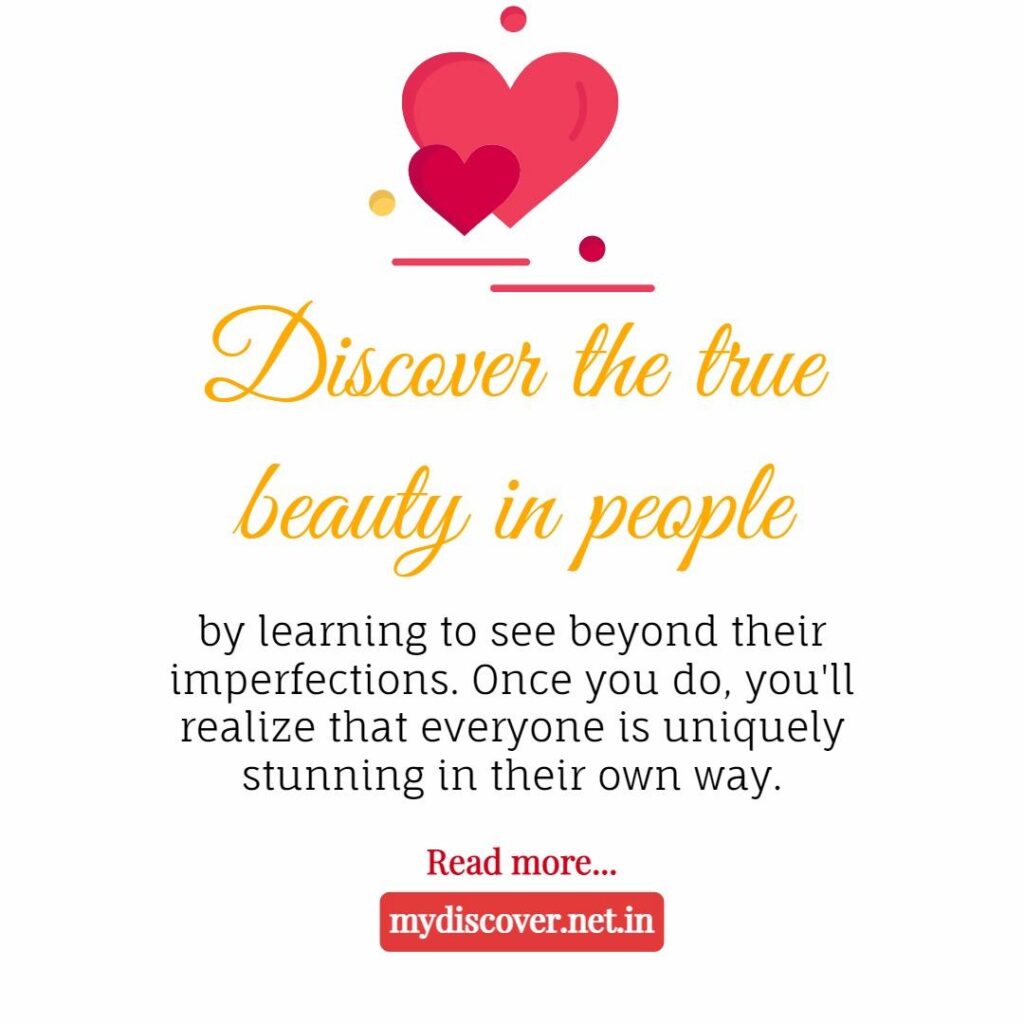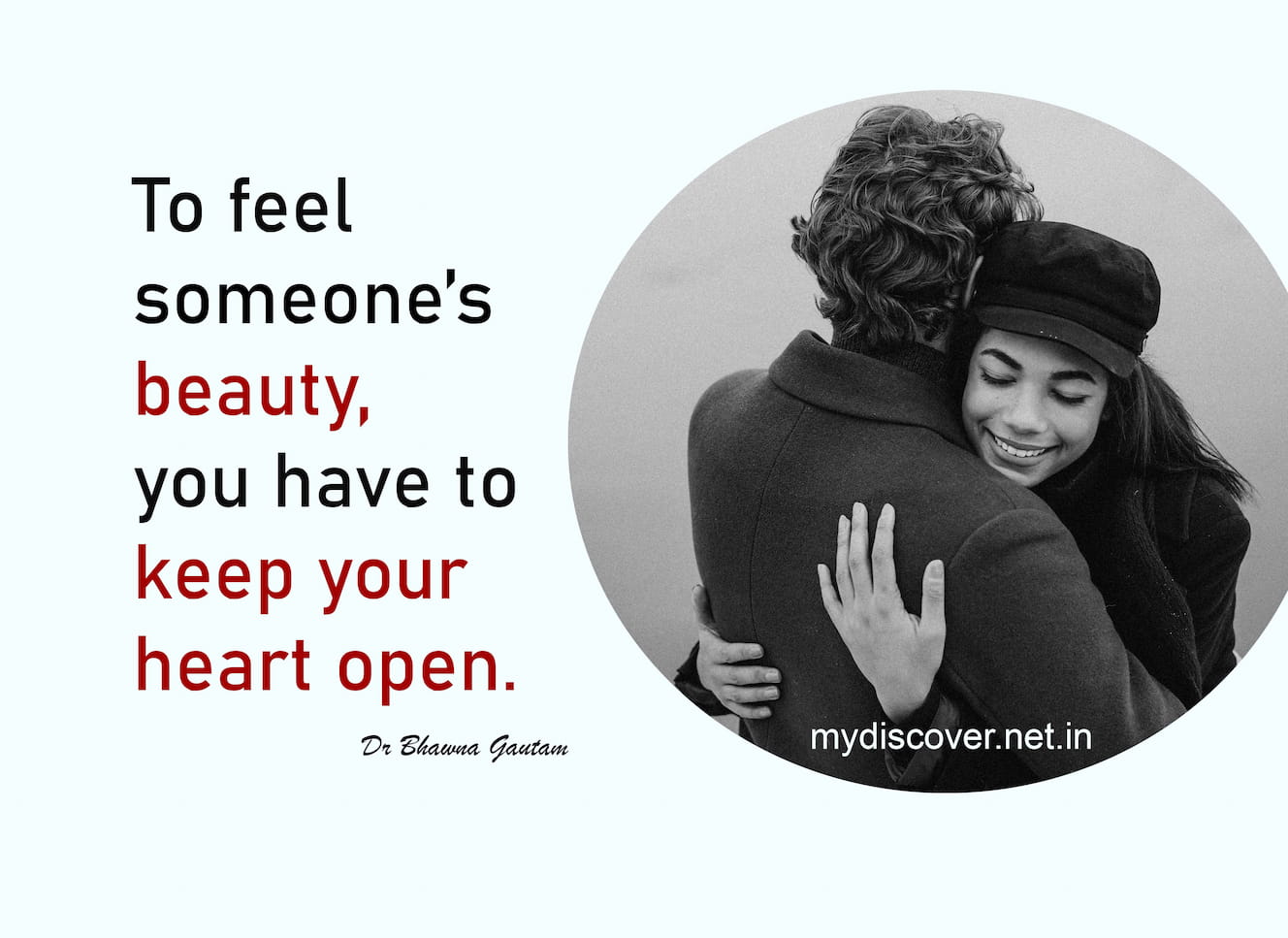
Embracing imperfections means accepting that nobody is perfect and recognizing the good in everyone, regardless of their flaws or differences. When we do this, we can build stronger connections with others and become more understanding and compassionate people. By embracing imperfections, we can learn to see the beauty in ourselves and others, even when things aren’t perfect.

In the book “Unspoken Words” by RPS, there is a heart-touching message that encourages readers to learn to look beyond the imperfections and discover the inherent beauty in every individual. This message resonates deeply and reminds us of the importance of embracing diversity and appreciating the uniqueness of every person we encounter.
Often, society places great emphasis on physical appearances and tends to judge individuals based on superficial standards. However, the author reminds us that true beauty lies beyond what meets the eye. When we learn to see beyond the external flaws and imperfections, we unveil the inner beauty that resides within each person.
This powerful message carries a profound impact. It teaches us to approach others with empathy, understanding, and acceptance. By looking beyond surface-level judgments, we can discover the remarkable qualities that make each individual special and extraordinary. We learn to value their experiences, talents, and the wisdom they have gained throughout their lives.
Moreover, this message of looking beyond imperfections extends not only to others but also to ourselves. It reminds us that we are all imperfect beings, and our flaws do not define us. By embracing our own imperfections and recognizing our inner beauty, we can cultivate self-love and acceptance.
The message from “Unspoken Words” encourages us to create a world where beauty is not confined to societal standards but rather reflects the unique essence of every individual. It inspires us to celebrate diversity, respect differences, and foster an inclusive society where everyone feels valued and appreciated.
In essence, by learning to look beyond the imperfections, we embark on a journey of compassion and understanding, and we realize that everyone, including ourselves, possesses an inherent beauty that is truly heartwarming.
Learn to look beyond the imperfections you will find everyone is beautiful
Looking beyond imperfections means seeing past the flaws and shortcomings of people and things, and recognizing the good qualities they possess. It is important to do this because everyone has something special and valuable to offer, even if they don’t meet our expectations of what is perfect or ideal. By embracing this mindset, we can appreciate the beauty in ourselves and others, and connect with people in a more meaningful way.
Remember, true beauty is not just about appearances, but also about what’s inside, such as a kind heart or a compassionate spirit.

Unlocking Fulfillment in a Flawed World
Accepting people’s imperfections is an essential part of living a fulfilled and content life. In today’s world, where social media and societal pressure are constantly telling us what a perfect life or perfect person looks like, it can be challenging to embrace imperfections. However, it is essential to realize that perfection is a myth, and everyone has flaws.
As human beings, we all have our own unique set of strengths and weaknesses. Our strengths are what make us shine, while our weaknesses are areas where we need to improve. It is essential to understand that nobody is perfect, and everyone has flaws. Accepting people’s imperfections means understanding that everyone has their own unique set of weaknesses, and it is these imperfections that make us human.
The problem with society is that we are often taught to focus on the negative aspects of a person rather than their strengths. We create mental pictures of what we think a perfect person looks like, and when we meet someone who does not fit into this picture, we reject them without even getting to know them. This behavior can be damaging because it prevents us from seeing the beauty and value in people who are different from us.
To accept people’s imperfections, we must learn to approach life with a positive mindset. When we have a positive outlook on life, we tend to see the good in people, and we are more likely to accept their flaws. A positive mindset allows us to be more open-minded and accepting of people who are different from us. It also enables us to see the beauty in diversity and appreciate the unique qualities that each person brings to the table.
Embracing people for who they are means accepting them for their strengths and weaknesses. It means being willing to get to know someone and understanding their perspective, even if it is different from ours. When we accept people for who they are, we create an environment of love and acceptance, which can lead to meaningful relationships and connections.
It is also essential to recognize that we all have blind spots when it comes to our own imperfections. It is easy to criticize others for their flaws, but we often struggle to see our own. Accepting people’s imperfections requires us to be self-aware and recognize our own weaknesses. When we are aware of our own flaws, we can be more compassionate and accepting of others who have different imperfections.
Accepting people’s imperfections is essential for living a fulfilled and content life. It requires a positive mindset, an open heart, and a willingness to embrace diversity. When we accept people for who they are, flaws and all, we create an environment of love and acceptance, which can lead to meaningful relationships and connections. Remember, everyone is beautiful in their own unique way, and we only discover this beauty when we remove the blindfold of our own thoughts and judgments.
When we accept people’s imperfections, it means we understand that everyone is different and has their own struggles. We need to respect and support them in their journey, even if they don’t fit our idea of a “perfect” person. It’s also important to remember that accepting people’s imperfections can help us grow and become more understanding and empathetic.
However, accepting people’s imperfections does not mean ignoring harmful behavior. We need to set boundaries and hold people accountable for their actions, while still recognizing their imperfections.
Overall, accepting people’s imperfections is about being kind and open-minded, and creating a world where everyone feels accepted and valued.
Embracing Imperfection: Unveiling the Path to Accepting People’s Flaws and Uniqueness
Accepting people’s imperfections is a process that requires effort and intention. Here are some steps you can take to start accepting people’s imperfections:
- Recognize your own biases and judgments: We all have preconceived notions of what a perfect person looks like, and these biases can prevent us from seeing people’s strengths and beauty. By recognizing our own biases and judgments, we can begin to challenge them and approach people with a more open mind.
- Practice empathy: Empathy is the ability to understand and share the feelings of others. Practicing empathy means putting yourself in someone else’s shoes and trying to understand their perspective. By practicing empathy, you can develop a deeper understanding of people’s imperfections and appreciate their unique journey.
- Focus on strengths: Rather than focusing on people’s weaknesses, try to focus on their strengths. Everyone has something that they are good at, and by focusing on these strengths, you can appreciate their unique talents and contributions.
- Be kind and compassionate: Kindness and compassion are essential qualities when it comes to accepting people’s imperfections. By being kind and compassionate, you create a safe and supportive environment where people feel comfortable being themselves.
- Practice self-reflection: Self-reflection is the process of examining your own thoughts, feelings, and behaviors. By practicing self-reflection, you can become more aware of your own biases and judgments and work towards accepting people’s imperfections.
In conclusion, accepting people’s imperfections requires effort and intention, but it is a process that can lead to personal growth and a more fulfilling life. By recognizing our own biases, practicing empathy, focusing on strengths, being kind and compassionate, and practicing self-reflection, we can begin to embrace diversity and appreciate the beauty in imperfection.

Navigating the Imperfections of Loved Ones: Embracing Diversity and Strengthening Relationships
Accepting people’s imperfections can be particularly challenging when it comes to loved ones who make decisions that hurt us. It is natural to feel hurt and upset when someone we care about makes choices that go against our own values or expectations. However, it is still possible to accept their imperfections while still honoring your own feelings and boundaries. Here are some steps you can take:
- Acknowledge your feelings: It’s okay to feel hurt and upset when a loved one makes a decision that goes against your own values or expectations. Take the time to acknowledge and process your emotions and allow yourself to feel them fully.
- Communicate with your loved one: It is important to communicate with your loved one in a respectful and honest way. Let them know how their decision has affected you and how you feel about it. Try to listen to their perspective as well, and work towards finding common ground.
- Set healthy boundaries: It is important to set healthy boundaries when it comes to accepting your loved one’s imperfections. If their decision has a negative impact on your own well-being, it may be necessary to set boundaries to protect yourself. This can include taking time for self-care, limiting contact with your loved one, or seeking support from a therapist or trusted friend.
- Practice empathy: Try to put yourself in your loved one’s shoes and understand their perspective. Recognize that they are on their own journey and may have different values and priorities than you. By practicing empathy, you can develop a deeper understanding of their imperfections and work towards accepting them.
- Focus on love and connection: Despite your differences, it is important to focus on the love and connection you share with your loved one. Remember that accepting their imperfections does not mean condoning harmful behavior, but rather recognizing that everyone has their own journey and struggles. By focusing on love and connection, you can work towards building a stronger and more supportive relationship with your loved one.
In conclusion, accepting loved ones’ imperfections can be challenging, but it is still possible to do so while honoring your own feelings and boundaries. By acknowledging your feelings, communicating with your loved one, setting healthy boundaries, practicing empathy, and focusing on love and connection, you can work towards embracing diversity and appreciating the beauty in imperfection.